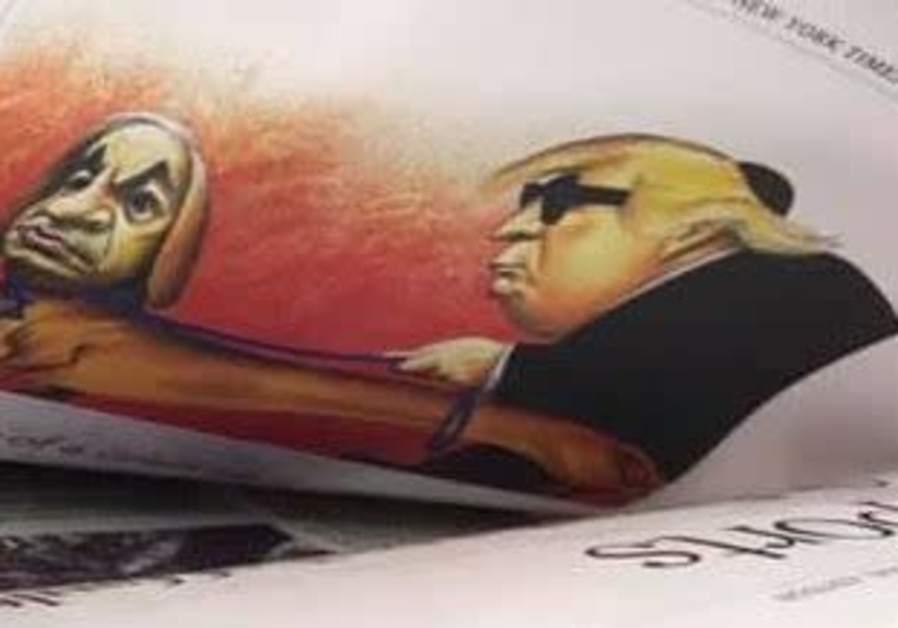New York Times cartoonist to ‘Post’: Caricature was not antisemitic

The New York Times cartoon by António Moreira Antunes. (photo credit: SETH J. FRANTZMAN)
Antonio Moreira Antunes, the cartoonist behind a recent controversial caricature in The New York Times, told The Jerusalem Post on Tuesday that he does not understand how people view his work as antisemitic.
Antunes has served for several decades as a cartoonist for the Portuguese newspaper Expresso. Last week, a cartoon he drew of Prime Minister Benjamin Netanyahu and US President Donald Trump was reprinted in The International New York Times, igniting a firestorm of controversy. The Times at first deleted the cartoon from its syndication website, said it was offensive and that it was an “error of judgement” to print it. But the paper later offered a full apology, saying it was “deeply sorry” and that “we are committed to making sure nothing like this happens again.”
Antunes, for his part, was unapologetic on Tuesday.
“Trump’s erratic, destructive, and often blind politics encouraged the expansionist radicalism of Netanyahu,” he wrote in an emailed response to questions from the Post. “To illustrate this situation, an analogy occurred to me with a blind man (Trump) led by a guide dog (Netanyahu) and, to help identify him, little known in Portugal, I added the Star of David, symbol of the State of Israel and central element of its flag.”
Antunes did not attempt to explain why he drew a kippa on Trump. He also did not respond to a question about the reactions of either The New York Times or his employer, Expresso, to the cartoon.
“I do not seek controversy,” he wrote. “I try to make critical cartoons of situations that seem to me wrong, unfair and undemocratic. I have already made drawings on the politics of my country, Spain, France, Russia, Italy, Iran, China, Saudi Arabia, USA, Brazil, United Kingdom, North Korea etc., etc.”
Antunes bristled at the notion that his cartoon would be viewed as antisemitic.
“What will be the reason why I can not do a critique of Israeli policy without being immediately categorized as anti-Semitic?” he wrote. “I have nothing against the Jews but I have many things against the politics of Israel.”
Despite Antunes’s denial, The New York Times called the cartoon antisemitic, as did the Anti-Defamation League, the American Jewish Committee and a slew of US congressmen and media figures, as well as Trump himself and US Vice President Mike Pence.
More than 35 years ago, Antunes also drew ire from Jewish groups with a caricature relating to the Israeli-Lebanon war, which depicted IDF soldiers as Nazis. That cartoon won him an international prize in 1983, despite outcry from the Jewish community.
Join Jerusalem Post Premium Plus now for just $5 and upgrade your experience with an ads-free website and exclusive content. Click here>>






Comments are closed.